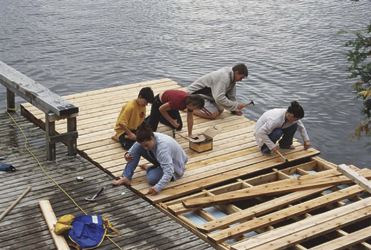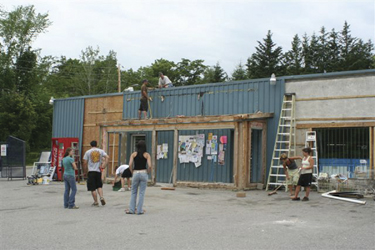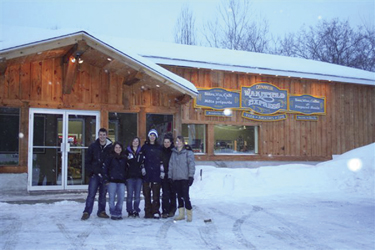
 |
||
About Articles Quotes Editor's Blog |
||
Unschoolers Prospering in the Real World
|
 |
At our house, whatever the project, the kids were involved, from their opinions of how they would like to see the end result and through each workable stage. We ripped the summer kitchen off the back of the house to build a sun room, tore the wall out from between the kitchen and dining room to make one big room, put new drywall up and new flooring down, gutted and renewed the bathroom, painted, wallpapered, built a dock on the river and a deck off the sun room, constructed picnic tables, laid interlocking stone around the deck and several other landscaping projects. If the kids were willing participants, they were included at the level of their abilities.
Home Business Helpers
With Ed’s business located in our house and his sister being the office receptionist, the kids often spent time in the clinic during office hours, just to visit with their aunt. It didn’t take long before Diane gave them little jobs like putting files back on the shelf in alphabetical order and counting the cash for the weekly deposit. While our kids were young they had more contact with adults than children their own age and adapted to a more mature level of interaction with the people around them. I am positive that time spent in the clinic as young people helped cultivate those social skills.
So, during those early years as the kids were growing up, we spent our days working on the house, reading together as a group for hours on end and running a public business from our home. Once and often twice per week, the kids and I would go to the city to make the business bank deposit, do personal banking and shop for groceries. It didn’t take long for them to figure out that as long as we put a deposit into the bank a little money would come back to buy the good food, clothing and things they liked to have.
Learning on the Road
Until 1996, that was the rhythm of our lives. That year, an opportunity surfaced that gave Ed and me a chance to live out our dream of traveling with our children. Ed sold the practice; we sold most of our personal belongings and rented out the house. We packed the eight of us into our van with a minimal amount of necessities and over a little more than three years, drove to the bottom of South America and back.
Life learning.... Hmmm. New languages, new cultures, experiencing geography, map reading, investigating historical sites, budgeting, currency exchange – the list of learning opportunities is endless. But most of all, we learned to get along with each other.
| "The question of whether this unconventional lifestyle prepares kids for the “real world” is not really a question to me at all. Our children have always been a part of the real world . . . They have doubled the income from when we took possession [of the store], increased the value of the property and the business, created employment for themselves and others and started an investment to build a financial portfolio for their futures." |
Part of our travel opportunity was the possibility of Ed working in Chile. We arrived six months after our Canadian departure and circumstances worked in favor of turning our Chilean visit into almost two years. During that time, Ed set up four chiropractic clinics and had other North American chiropractors join in on his venture. It was the second summer in Chile when the receptionists to the clinics were taking summer vacations that Tanya, at 14 years old, filled an “adult” job. It involved receiving and acknowledging people by name, having their files ready to go with them, being courteous, keeping files in order, answering the telephone, booking appointments, collecting payments and balancing at the end of the day. (There were only two occasions on which she didn’t balance during that six-week period.) This was servicing 60 to 80 people per day and to add to the challenge, she did it in Spanish, a language she could barely speak a year earlier. If Tanya hadn’t had all those earlier life learning experiences, she wouldn’t have been capable of doing that job. One might ask why a young person would even want to do such a thing but Tanya enjoys being busy and likes interacting with people. She found a purpose and direction to put her energy into a meaningful contribution to others with a financial reward for herself during weeks when she had little to do. On completion, she had such a positive sense of accomplishment for herself and felt like a truly worthy person. I wish every young teen had the opportunity to have that good feeling about themselves.
We returned to Canada in March of 2000. Ed purchased his clinic back; we picked up life right where we left off and continued our home-based education lifestyle. Our house was in need of plenty of maintenance on our return and our work crew went at it with enthusiasm after having lived in tents for a year. The third floor attic was turned into two more bedrooms to accommodate our growing family; Ben wanted a room of his own. He, in particular, did most of the planning but once he got started the rest of us joined in.
So the question of whether this unconventional lifestyle prepares kids for the “real world” is not really a question to me at all. Our children have always been a part of the real world and of the work- force when they chose that route for themselves. And the next question would be: What about post secondary education? From watching a generation of young people raised in this manner, it has been confirmed in my mind that when a child or teen is given the opportunity to discover the world and we adults help facilitate their interests, they will find somewhere they want to put their energy. If they discover they want to become a member of a particular profession that requires credentials, they will do what they have to do to get where they want to go.
Designing Their Own Way
For instance, Tanya educated herself in ways that interested her. At 16, she started to work as one of Ed’s chiropractic assistants and managed the office up until September 2006. With ski racing being one of her favorite activities, she obtained her Level II ski coaching certification and coached during the winters for the Vorlage Racing Club in Wakefield. To expand her social life, she worked as a server at the Earle House Restaurant in the village as well. On turning 18, she began work on her Fashion Design Certificate through Algonquin College in nearby Ottawa and took courses out of interest at the University of Ottawa until she was accepted into the Theater Design Program at Concordia University in Montreal. She has been attending school there full-time since but spends most of her free time back home in Wakefield earning income to get through university without student loans.
Ben went to high school for one day after our return and decided he preferred designing his own education. We live in a tourist village and he started working at the Earle House Restaurant as soon as they would let him. He likes having cash in his pockets. One winter in Whistler was enough for him to decide that he wanted more out of life than working for someone else and riding slopes. On his return in the spring, he again worked at the restaurant until doing odd jobs turned into full-time work. He started at the University of Ottawa that September with the ambition of becoming a chiropractor like his father. It took three semesters for him to figure out that he was going to be broke for a long time only to work in a job that depended on him to be there to earn income. He doesn’t like being without money and has been learning business strategies to build passive income with the aim of becoming financially independent. He has been self-employed in his own odd-job business and provides work to friends and his brother when he has more than he can manage.
Tanya and Ben were the trail blazers for Dayna, Karina, Jake and Whitney. Whatever project the older kids were doing, the others were usually included. This then extended to summer employment at the restaurant as well. All but Jake worked there to earn spending money and be part of the community. Jake preferred babysitting.
By the time Dayna reached high school age, her homeschooled peers had chosen to attend school. Every teenager needs a social life and she decided to try school the year she was at a Grade 10 age level. She entered Grade 10 and proved to me that when a kid goes to school for their own reasons, they do just fine. Dayna is an avid skier with a passion for racing. To help fund her equipment and travel costs, she worked at the restaurant during the summer tourist season and in the clinic for her father. Dayna obtained her Level 1 ski coaching certification and works part-time coaching in Vorlage’s Nancy Greene program for ski racers. She is now at college in a Commerce Program and has just applied to three universities to study International Business Management. She has her social life, is doing things she loves to do and is gaining an education at a pace that allows for living a life at the same time.
  |
Karina started babysitting for the people who ran the restaurant at 13 years of age and, when tourist season got busier than was manageable, ended up working in the kitchen like her older siblings. It was a job that padded her bank account but she did it mostly because people valued her contribution and the job increased the circle of friends she spent time with. It was her decision to follow Dayna’s footsteps in attending high school and the Commerce Program at college because her ambition is heading towards university and Business Law.
In August of 2005, Tanya and Ben were figuring out their fall semester course load at university, Dayna decided to work on her advanced math credit and Karina was tossing around the idea of high school. Jake was 13 at the time. There was plenty of talk of institutional education and he must have been feeling some pressure. He asked, “Mom, do I ever have to go to school?” My reply was simply, “That all depends on what you want to do with your life, Jake. Do you have any idea of how you want to support yourself and earn a living when you are older?” He was quick to answer. “I just want to have a business of my own.” And what kind of education do you need to do that? Of course it depends on the type of business, but just because we don’t learn within the confines of an institution doesn’t mean we don’t gain an education and become competent at what we choose to do with our lives.
And Whitney – she was always included in every thing we did. When the restaurant was in desperate need of a dishwasher and Tanya asked her if she wanted to earn some money, she jumped at the opportunity to join the work force and spend more time with her sisters. She, too, is an avid ski racer but equipment and expenses are costly. She loves the speed and racing is what she likes to do. Better equipment means greater speed and to obtain the skis she wants she contributes to their cost.
Entrepreneurship
During the spring of 2006, we had a contractor lined up to remove the roof of our house and replace it with a new one. Just weeks before we expected work to begin, he called and backed out of the job, saying he was too busy. We needed a new roof and contractors were not to be found at that point in the season. Ben spent most of an afternoon thinking the job through and announced to his dad that he and Jake could do it. That was the year roles switched between parents and kids. All of a sudden Ed and I became the “gofors” and our children were giving the directions. As a family, we constructed a new roof for our house. And all those years I didn’t think I had enough patience.... We have a dry and warm roof and it wouldn’t have happened that year without our kids.
And that brings us to the year we have just lived through. When the store came up for sale and the kids had plenty of confidence in themselves as a result of so many previous accomplishments together, a bigger project seemed like a natural step. We spent most of last summer as a family giving the store a facelift and making it a more pleasant place to be a customer. It is amazing what a crew of eight people working together on a common project can accomplish in a short period of time; but then again, we have had plenty of practice and are almost pros at it now.
It is interesting to watch how these young business owners have taken charge, doing the bookkeeping, placing and receiving orders, stocking shelves, working with customers, cleaning, organizing and discussing the details of the changes and improvements they want to implement and then doing it. We did have moments of concern just because we were – are – learning how to run a business through trial and error. But as much as the kids needed our help in the beginning, they are now running the store with very little input from us. They have doubled the income from when we took possession, increased the value of the property and the business, created employment for themselves and others and started an investment to build a financial portfolio for their futures. A year ago, the prospect of what was about to unfold was daunting, but what a year of learning! And if that group of kids had attended the mainstream school system throughout their lives, I wonder where they would be.
Gaye Chicoine is a photographer by trade, mom to six life-learning young adults and partner to husband Ed. She has authored two books, loves to travel and after 18 years of un-schooling, still enjoys helping her children with their life directions and family business when it is requested of her. Gaye has published a book Living Dreams, the story about her family’s South American journey and the learning that resulted. This essay is included in the book Life Learning: Lessons From the Educational Frontier.